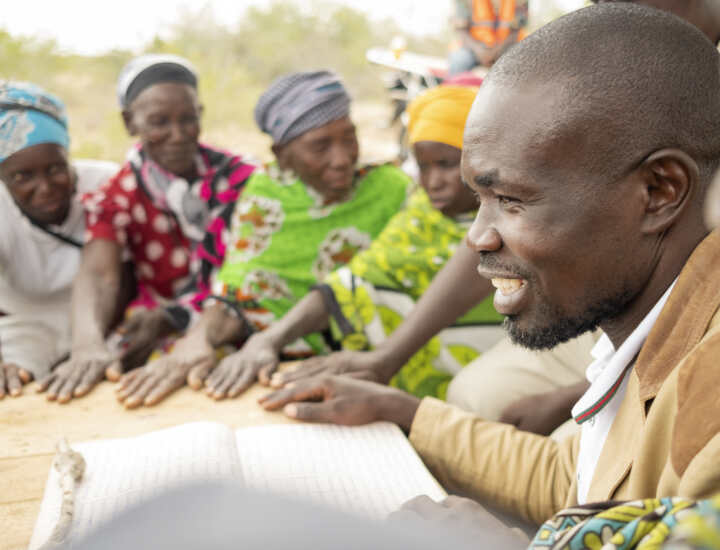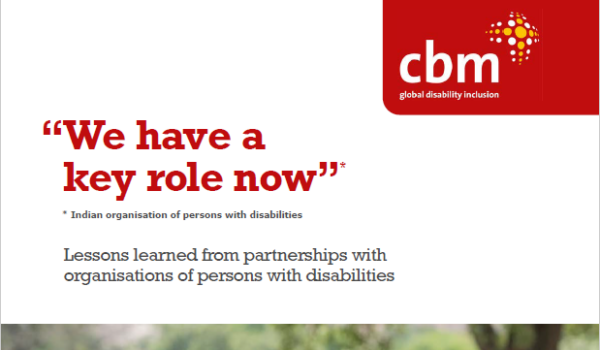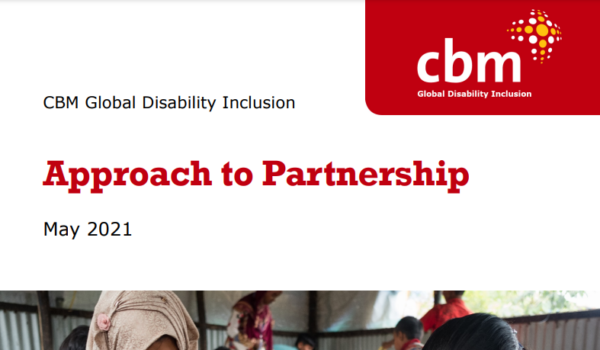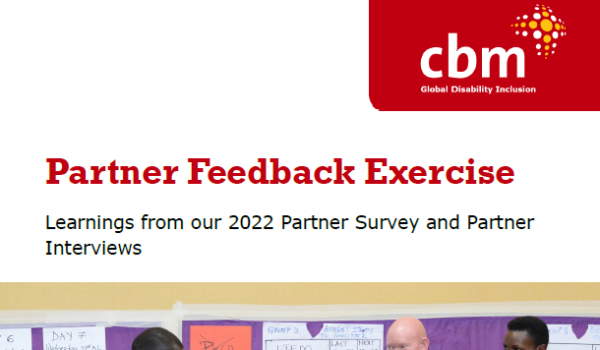CBM Global is a Charter4Change signatory
The Charter 4 Change is an initiative led by National and International NGOs to practically implement changes to the way the Humanitarian System operates to enable more locally-led response.
Signatories to the Charter4Change welcome the increasing recognition that action on locally-led crisis response has been inadequate and that transformative reform is needed.
As a signatory, CBM Global is committed to implement the 8-point Charter4Change by 2026 and to report annually on progress. A set of commitments have been agreed that CBM Global as a Federation is pursuing to achieve its strategy to becoming more locally led in relation to its partnerships. These commitments align with the 8 point Charter4Change. The commitments span strategy development and monitoring processes, partnership approach, organizational strengthening, programme management, organizational structures, communications, marketing & fundraising. An action plan has been developed to identify the priority actions needed to operationalize these commitments.

Our Charter4Change commitments
Here is a summary of the 8 Charter4Change commitments and our activities around each.
-
Point 1 DIRECT FUNDING. Increase direct quality funding inclusive of Indirect Cost Recovery to national and local NGOs for humanitarian action
CBM Global has a strong partner based approach and we are already channelling the majority of our humanitarian and development funding through national and local organisations. We have a commitment towards organisational strengthening of our partners and the diversification of income streams, including accessing direct financing from donors. In 2023 CBM Global introduced a guidance note “Contribution to Partner Overheads in Project budgets” to ensure a more consistent approach is taken towards contributing Indirect Cost Recovery for our partners.
-
Point 2 PARTNERSHIP. Affirm and endorse the outcomes of the Grand Bargain Caucus on the Role of Intermediaries and the IASC risk sharing framework
This commitment calls upon agencies to endorse and go beyond the UN/NGO Principles of Partnership (Equality, Transparency, Results-Oriented Approach, Responsibility and Complementarity) by establishing clear systems and processes to action these in our agencies and with our local partners.
The UN/NGO Principles of Partnership closely align with CBM Global’s own partnership principles which were developed in close consultation with our partners. CBM Global is embedding our partnership principles across all of our work and relationships. We reviewed our partnership assessment process in 2023 and renewed our commitment to meeting partners where they are and investing in mutual growth. CBM Global’s commitment to listening to partners is reflected through the partner feedback exercise that is carried out every two to three years and followed up with a specific plan of action. Mid term reviews, evaluations, and annual reflection workshops are carried out with our partners.
-
Point 3 TRANSPARENCY. Increase transparency around resource transfers to national and local NGOs
CBM Global is committing to documenting and publicizing our implementing partners through our website, social media and annual narrative reporting. In 2023 a total of EUR 3.55M humanitarian expenditure was incurred by CBM Global local and national partners. The total humanitarian expenditure for this period was EUR 4.12M.
-
Point 4. RECRUITMENT Stop undermining local capacity
CBM Global has HR procedures in place which pursue open and fair recruitment processes. We are very conscious of the negative impacts for national and local organisations if their capacity is undermined by INGO or UN recruitment processes. CBM Global does not deploy expatriates in its work and always pursues national staffing and leadership.
-
Point 5. ADVOCACY Emphasise the importance of national actors
CBM Global will continue to pursue our partner based approach and we advocate this approach to donors as part of our advocacy on inclusive development and inclusive humanitarian action. CBM Global is advocating to donors on the need to increase funding allocations to national and local NGOs and to address any donor compliance requirements which can be a hindrance to this process.
-
Point 6. EQUALITY Address subcontracting
Participation through all stages of the project cycle is a core component of CBM Global’s partnership approach. CBM Global seeks to ensure a clear and mutually agreed rationale for partner engagement in all aspects of project cycle management, including clear criteria for roles of partner and sub partner.
-
Point 7. SUPPORT Robust organisational support and capacity strengthening
CBM Global is developing a specific strategy in defining and resourcing our approach to partner organisational strengthening. We are seeking to consistently include budget provisions for organisational strengthening and a recognition of core running costs as a necessary component of project management.
In 2023 a total of EUR 46,650 was spent specifically on humanitarian capacity strengthening. CBM Global supported 15 national and local partners including Organisations of Persons with Disabilities through non humanitarian budgeted activities. External evaluations, real time evaluations, midterm reviews and reflection activities were also carried out. These activities have led to enhanced capacities of CBM Global and our local and national partners, including Organisations of Persons with Disabilities.
-
Point 8. PROMOTION Communication to the media and the public about partners, crisis affected communities and the contexts in which we operate.
CBM Global in all our communication is committed to modelling and promoting the strategic role of local and national actors in achieving locally led inclusive development and inclusive humanitarian action.



